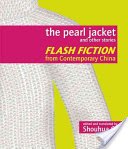home
current issue
featured poet
poem of the week
lives of the poets
poetry near you
reviews
archives
subscribe
donate
about us
contact us
The Pearl Jacket:
Flash Fiction from contemporary China
reviewed by Erna Picard
 The Pearl Jacket: Flash Fiction
The Pearl Jacket: Flash Fiction
from Contemporary China.
Shouhua Qi, trans. & ed.
Stone Bridge
Flash Fiction is an old literary form that has been employed by writers around the world since Aesop’s time. With a simple, handy-to-work-with editorial size, this two to four page length form that Kawabata called a “palm of the hand” tale, is enjoying a new vogue internationally. In Asia where it has a hoary lineage, it was originally thought of as a story that could be read in the amount of time it takes to smoke a cigarette. The ultra-short story form caught on with newspapers who paid writers by the word, a thrifty form of soliciting copy.
North Americans will likely recognize flash fiction as a staple element of Reader’s Digest feature writing. Handled well, it’s an imaginative, skillful form of storytelling that doesn’t tax the reader.
As this substantial collection demonstrates, Chinese authors, readers and publishers appreciate the flash form as well. Translated and edited by Shouhua Qi, who teaches at Western Connecticut State U., these 120 stories offer a provocative, insightful look into contemporary life in China, including 19 entries from Taiwan, Hong Kong and Macau. It’s a talented compendium that includes modern titans from the 1920s like Lu Xun and Lao She, as well as diverse contemporary heavy-hitters such as Feng Jicai (Ten-Inch Golden Lotus), Chen Rong, Wang Meng, Ya Dafu, and both Ku Ling and Li Ang from Taiwan.
Typically, these are stories that aren’t likely to upset anyone. Divided in to seven sections headed Relationships, Family, Portraits, Society, Truth and Art, Existential Moments, and The Strange and Extraordinary, sentimentality and bathos saturate the family and relationship-themed tales and are least likely to excite readers in English. But China’s writers are too good and too broad for there not to be solid material in this collection, though with its size some digging is necessary. “Door Forever” by Shao Baojian is a brilliant story of an aging bachelor artist and his unrequited love, and one half expects to see a film made of it along the lines of Balzac and the Little Chinese Seamstress.
History and administrative tensions are never far from Chinese literature: “A Bridge Pillar” by Yang Xiangsheng straddles the genre of selfless hero somewhere between Lao She’s memorable storytelling and good old Uncle Mao’s proletarian agit-prop. Li Qixiang’s “Black and White” reflects the Chinese government’s continual struggle to overcome administrative corruption. Two of the most engaging tales, however, are surely Wu Di’s “Mosquito Nets”, with its recent depiction of the eternal struggle for intimacy within a society where the concept of “privacy” as Westerners know it is still challenge; and “Happy Family”, a chillingly surreal account of a single working man who retains the services of a rental agency to provide him with periodic visits of “a happy family”—loving wife, three beaming children, a wonderful evening at home together. With China’s dramatic urban imbalance between marriageable young men and women, it may not be quite as fantastic an account much longer.
Whether seeking artful entertainments or work reflecting the specifics of getting along in a chop and chance economy, those readers appreciative of a broad canvas of insights from China’s current state of letters will find these Flash Fictions the Middle Kingdom well worth a look.
A graduate of Cambridge, Erna Picard writes from Honolulu. She studied and taught in China for eight years.
This review first appeared in Pacific Rim Review of Books #20